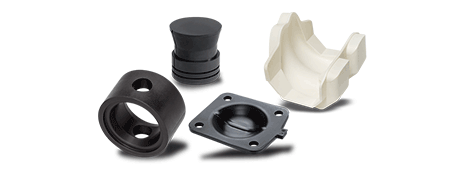Our municipal customers and customers in the pharmaceutical and medical industries in particular must ensure that all moulded parts subsequently fitted comply with respective legal requirements, and any other requirements.
Selection according to approval/conformity
Several regulatory codes usually apply in the area of hygienic and sterile applications, and these are designed to ensure that no pathogens or impurities can enter human or animal bodies. As elastomers and plastics come into contact with infusion solutions, implants, drinking water or other liquids and objects in the form of O-rings, diaphragms or covers, etc., they must either be compliant with these, or have the corresponding approval. This is why careful consideration must always be given to the choice of material and compound. While an elastomer material may have the required approval, it is also possible that this approval may be rendered invalid due to an additive.
Approvals and conformities for sterile applications
Intercarat knows the requirements placed by customers from the medical and pharmaceutical industries on their own quality management. For this reason, several materials which we process are FDA-compliant (for example EPDM and medical silicone compounds). The EPDM compounds which we use have also been successfully tested as per USP Class VI.
As raw material suppliers react to market requirements at short notice, we can usually also obtain material even if there is no approval or conformity in the "standard", for example for NBR. Some of the thermoplastic materials which are available are compliant with FDA, USP Class VI and 3A.
Approvals and conformities for hygienic processes (foodstuffs and drinking water)
- Drinking water
We comply with current approvals for the processing, treatment and distribution of drinking water with various materials and compounds, including EPDM, NBR or VMQ. Examples of these include DVGW (German Technical and Scientific Association for Gas and Water), ACS (Certificate of Sanitary Conformity), WRAS (UK Water Regulations Advisory Scheme) or KTW (drinking water in accordance with the elastomer guideline) as well as several other standards, if required.
- Foodstuffs
In recent years, an increasing number of regulations and standards have been introduced in the area of manufacturing foodstuffs and beverages. The most current one is the General Food Law Regulation according to EC 1935/2004, for which we can use various materials to ensure compliance. Materials and compounds with additional approvals are also available.
Additional approvals and conformities
We also produce moulded parts made of materials/compounds which (additionally) comply with the following standards and regulations:
- Free of additives of animal origin (ADI-free or BSE-/TSE-free)
- "Good Manufacturing Process" regulation according to EC 2023/2006
This list is not conclusive but does show the variety of requirements which we work with on a daily basis. We would be happy to check whether your final specification and selected compound have all the required approvals/conformities.
Composite parts
In addition to elastomer/plastic moulded parts, we also produce composite parts made of elastomers and metal as well as thermoplastic materials and metal. This combination not only changes the physical and chemical properties. The metal parts must also be compliant as a result of a suitable material being selected (for example for contact with media).
